Have you ever lost your research data? Left a memory stick in a public computer? Not been able to find the crucial bit of data underpinning your publication? In a return to our in-person Digital Research Conversations, held on the 2nd November 2022, we covered some data horror stories but most importantly, offered advice on how to avoid creating more horror stories in the future!

In the first part of the session we focused on secure storage, with Dr Juliane Kloess (Assistant Professor in Forensic Psychology, now at the University of Edinburgh) describing the issues around handling sensitive data and Dr Stephanie Thompson (Advanced Research Computing) describing the secure storage and backups available at the University – see the Research Data Store pages. Angeliki Andrikopoulou (Library Services) then gave some horror stories around file management and described the benefits of good data management planning – see the Research Data Management pages.
After a break for some lunch, Professor Petar Milin (Professor of Psychology of Language and Language Learning) discussed data horror stories around coding and data analysis and Angeliki discussed ways to openly share data via repositories. We wrapped up with a discussion session where the audience gave their own data horror stories and advice was given on using code repositories and sharing sensitive data.
The researchers presented their horror stories without slides but Stephanie and Angeliki’s slides can be found via the Digital Research Conversation Canvas course, which University of Birmingham researchers can sign up to here: https://canvas.bham.ac.uk/enroll/Y7C7LY
Next Digital Research Conversation – 7th June, 2023
In our next Digital Research Conversation, we will be discussing how you can ‘love your code/software’. We will ask Andrei Nicusan, a PhD student in Engineering to pose the question that he has been pondering, how can you balance the rights of the author with the rights of open source? Does pushing everything to open source negate the intellectual property of the work a researcher creates?
We have a group of academics from the Law School, Library Services and our own Research Software Engineers who will try and answer the question. Sign up for your place via the Eventbrite booking page.
